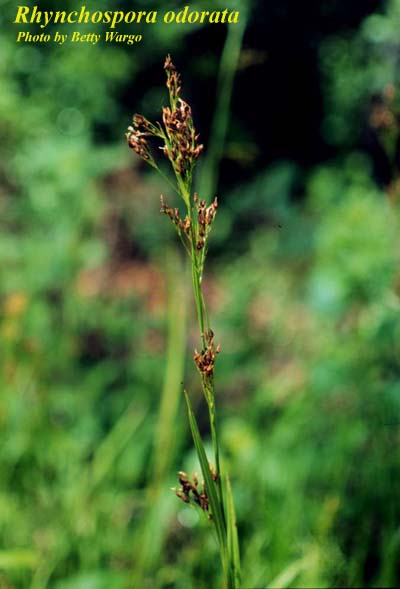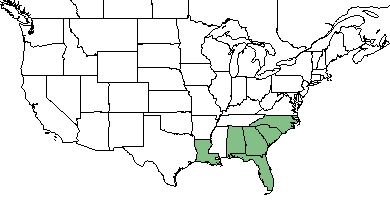Difference between revisions of "Rhynchospora odorata"
HaleighJoM (talk | contribs) (→Ecology) |
|||
| (8 intermediate revisions by 5 users not shown) | |||
| Line 1: | Line 1: | ||
{{italic title}} | {{italic title}} | ||
| + | Common name: fragrant beaksedge <ref name= "Weakley 2015"/> | ||
<!-- Get the taxonomy information from the NRCS Plants database --> | <!-- Get the taxonomy information from the NRCS Plants database --> | ||
{{taxobox | {{taxobox | ||
| Line 23: | Line 24: | ||
==Description== | ==Description== | ||
| − | ''R. odorata'' is a perennial graminoid of the Cyperaceae family that is native to North America. <ref name= "USDA"> [https://plants.usda.gov/core/profile?symbol=CEAM USDA Plant Database]</ref> | + | ''R. odorata'' is a perennial graminoid of the Cyperaceae family that is native to North America.<ref name= "USDA"> [https://plants.usda.gov/core/profile?symbol=CEAM USDA Plant Database]</ref> |
<!-- Basic life history facts such as annual/perrenial, monoecious/dioecious, root morphology, seed type, etc. --> | <!-- Basic life history facts such as annual/perrenial, monoecious/dioecious, root morphology, seed type, etc. --> | ||
==Distribution== | ==Distribution== | ||
| − | ''R. odorata'' is commonly found in the southeastern United States; specifically Florida, Georgia, South Carolina, North Carolina, Alabama, and Louisiana. <ref name= "USDA"> [https://plants.usda.gov/core/profile?symbol=CEAM USDA Plant Database]</ref> | + | ''R. odorata'' is commonly found in the southeastern United States; specifically Florida, Georgia, South Carolina, North Carolina, Alabama, and Louisiana.<ref name= "USDA"> [https://plants.usda.gov/core/profile?symbol=CEAM USDA Plant Database]</ref> |
==Ecology== | ==Ecology== | ||
===Habitat=== <!--Natural communities, human disturbed habitats, topography, hydrology, soils, light, fire regime requirements for removal of competition, etc.--> | ===Habitat=== <!--Natural communities, human disturbed habitats, topography, hydrology, soils, light, fire regime requirements for removal of competition, etc.--> | ||
| − | ''R. odorata'' proliferates in maritime swamp forests and maritime wet grasslands. <ref name= "Weakley 2015"> Weakley, A. S. (2015). Flora of the Southern and Mid-Atlantic States. Chapel Hill, NC, University of North Carolina Herbarium. </ref> | + | ''R. odorata'' proliferates in maritime swamp forests and maritime wet grasslands.<ref name= "Weakley 2015"> Weakley, A. S. (2015). Flora of the Southern and Mid-Atlantic States. Chapel Hill, NC, University of North Carolina Herbarium. </ref> Specimens have been collected from dry sands, burned palmetto slashpine flatwoods, brackish marsh, moist roadside, willow thicket, pineland, swampy woodland, pine flatwoods, sand loam in hammock, mesic flatwoods, and in coastal hammock.<ref name = "FSU herbarium"> URL: http://herbarium.bio.fsu.edu. Last accessed: June 2018. Collectors: Loran C. Anderson, Leo L. Minasian Jr., R.K. Godfrey, C. Jackson, Robert Kral, Mabel Kral, Richard S. Mitchell, K. Craddock Burks, William Lindsey, D.B. Ward, D. Burch, J.N. Triplett, Delzie Demaree, Steve Orzell, E. L. Bridges, O Lakela, William R. Stimson, A. H. Curtiss. States and counties: Florida (Wakulla, Franklin, Levy, Dixie, Collier, Volusia, Sumter, Pasco, Jefferson, Nassau, Monroe, Hernando, Gulf, Dade, Clay, Charlotte, Citrus, Broward, Brevard, Marion)</ref> |
<!--===Phenology===--> <!--Timing off flowering, fruiting, seed dispersal, and environmental triggers. Cite PanFlora website if appropriate: http://www.gilnelson.com/PanFlora/ --> | <!--===Phenology===--> <!--Timing off flowering, fruiting, seed dispersal, and environmental triggers. Cite PanFlora website if appropriate: http://www.gilnelson.com/PanFlora/ --> | ||
<!--===Seed dispersal===--> | <!--===Seed dispersal===--> | ||
<!--===Seed bank and germination===--> | <!--===Seed bank and germination===--> | ||
| − | + | ===Fire ecology=== <!--Fire tolerance, fire dependence, adaptive fire responses--> | |
| + | Populations of ''Rhynchospora odorata'' have been known to persist through repeated annual burning.<ref>Platt, W.J., R. Carter, G. Nelson, W. Baker, S. Hermann, J. Kane, L. Anderson, M. Smith, K. Robertson. 2021. Unpublished species list of Wade Tract old-growth longleaf pine savanna, Thomasville, Georgia.</ref> | ||
<!--===Pollination===--> | <!--===Pollination===--> | ||
| − | <!--=== | + | <!--===Herbivory and toxicology===<!--Common herbivores, granivory, insect hosting, poisonous chemicals, allelopathy, etc--> |
| − | <!--==Diseases and parasites==--> | + | <!--===Diseases and parasites===--> |
| − | ==Conservation and | + | ==Conservation, cultivation, and restoration== |
| − | == | + | ==Cultural use== |
==Photo Gallery== | ==Photo Gallery== | ||
<gallery widths=180px> | <gallery widths=180px> | ||
</gallery> | </gallery> | ||
==References and notes== | ==References and notes== | ||
Latest revision as of 15:20, 15 July 2022
Common name: fragrant beaksedge [1]
| Rhynchospora odorata | |
|---|---|

| |
| Photo by John Gwaltney hosted at Southeastern Flora.com | |
| Scientific classification | |
| Kingdom: | Plantae |
| Division: | Magnoliophyta - Flowering plants |
| Class: | Liliopsida - Moncots |
| Order: | Poales |
| Family: | Cyperaceae |
| Genus: | Rhynchospora |
| Species: | R. odorata |
| Binomial name | |
| Rhynchospora odorata C. Wright ex Griseb. | |

| |
| Natural range of Rhynchospora odorata from USDA NRCS Plants Database. | |
Contents
Taxonomic Notes
Synonym: R. stipitata (Chapman)
Variety: none
Description
R. odorata is a perennial graminoid of the Cyperaceae family that is native to North America.[2]
Distribution
R. odorata is commonly found in the southeastern United States; specifically Florida, Georgia, South Carolina, North Carolina, Alabama, and Louisiana.[2]
Ecology
Habitat
R. odorata proliferates in maritime swamp forests and maritime wet grasslands.[1] Specimens have been collected from dry sands, burned palmetto slashpine flatwoods, brackish marsh, moist roadside, willow thicket, pineland, swampy woodland, pine flatwoods, sand loam in hammock, mesic flatwoods, and in coastal hammock.[3]
Fire ecology
Populations of Rhynchospora odorata have been known to persist through repeated annual burning.[4]
Conservation, cultivation, and restoration
Cultural use
Photo Gallery
References and notes
- ↑ 1.0 1.1 Weakley, A. S. (2015). Flora of the Southern and Mid-Atlantic States. Chapel Hill, NC, University of North Carolina Herbarium.
- ↑ 2.0 2.1 USDA Plant Database
- ↑ URL: http://herbarium.bio.fsu.edu. Last accessed: June 2018. Collectors: Loran C. Anderson, Leo L. Minasian Jr., R.K. Godfrey, C. Jackson, Robert Kral, Mabel Kral, Richard S. Mitchell, K. Craddock Burks, William Lindsey, D.B. Ward, D. Burch, J.N. Triplett, Delzie Demaree, Steve Orzell, E. L. Bridges, O Lakela, William R. Stimson, A. H. Curtiss. States and counties: Florida (Wakulla, Franklin, Levy, Dixie, Collier, Volusia, Sumter, Pasco, Jefferson, Nassau, Monroe, Hernando, Gulf, Dade, Clay, Charlotte, Citrus, Broward, Brevard, Marion)
- ↑ Platt, W.J., R. Carter, G. Nelson, W. Baker, S. Hermann, J. Kane, L. Anderson, M. Smith, K. Robertson. 2021. Unpublished species list of Wade Tract old-growth longleaf pine savanna, Thomasville, Georgia.